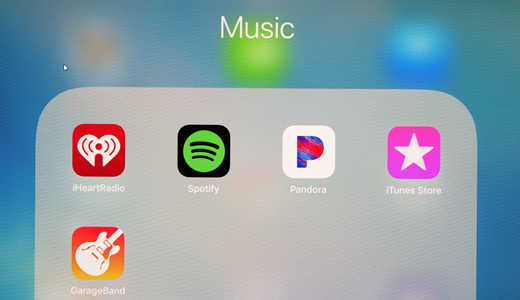Once upon a time, we bought CDs. (And before that, cassettes, vinyl records and, yup, even 8-tracks for a hot minute in the mid-’70s.) But that list illustrates an inescapable reality: Music formats eventually become obsolete.
CDs, while not technically extinct, have given way over the last two decades to digital music-streaming platforms such as Spotify and Pandora, not to mention YouTube and Amazon Music. And, of course, iTunes. I still remember the day a former boss of mine installed the services on her Mac in January 2001. “I just got iTunes!” she beamed. “What’s that?” I asked.
iTunes, of course, was Apple’s online music store. And when paired with the company’s super-snazzy new iPod, which debuted the following October, it was nothing less than a musical game-changer. Forget your old Walkman or Discman. Now you could have all the music you ever wanted in your pocket. It truly was a revolutionary product.
For 18 years, Apple’s iTunes store has evolved with the ever-changing music industry, all the while offering users the ability to purchase and download tracks and albums, TV shows and movies, as well as podcasts.
But just as the iPod eventually meandered into Jurassic-tech status, so now has iTunes. At Apple’s annual WWDC conference, the company announced that the latest version of its MacOS, Catalina, will no longer include iTunes. Instead, that app’s functions will be split into three separate apps: Apple Music, Apple TV and Apple Podcasts.
In her Rolling Stone article “Apple Is Finally Killing iTunes,” Amy X. Wang reflects on the platform’s influence:
It’s the end of a music era. Nearly two decades after launching iTunes and ripping up the retail-store model of album purchases, Apple is ready to retire the iconic product. … Welcome as the death of iTunes may be to frustrated users, the software will forever deserve credit for the revolution it engineered in the early 2000s. Before iTunes debuted, the music industry was tearing its hair out trying to combat illegal file-sharing on Napster; Jobs’ new product presented the digital era’s first sustainable, user-friendly way to listen to music.
Longtime users reportedly need not worry that their digital catalogs will face unplugged oblivion. Slate’s Aaron Mak reports:
Users who have spent the better part of two decades curating iTunes playlists with songs not available on Spotify have little to fear. According to a company spokesperson, when you update to MacOS Catalina, your iTunes songs and playlists will automatically transfer to Apple Music, your podcasts to Apple Podcasts, and your videos to Apple TV.
Music delivery methods continue to evolve. But pop music’s past refuses to march quietly into the dust bin of history. Last year, the Queen biopic Bohemian Rhapsody surprised nearly everyone by topping $900 million in total international box-office receipts as well as earning four Oscar noms, including Best Picture and Best Actor (which Rami Malek won).
And when a $900 million tree falls in the Hollywood forest, you can be certain that producers will suddenly be looking for more such trees. Hence, the Elton John biopic Rocketman, currently in theaters (though not likely to do as well as its predecessor due to its more explicit content and R-rating, risqué elements that Elton John himself reportedly wanted in the film). Up next: Boy George’s story, as well as various projects focusing on or drawing artistic inspiration from Pavarotti, Bob Dylan, The Beatles, Bruce Springsteen, The Go-Go’s and the Wu-Tang Clan, among others.
Meanwhile, the music industry is practically salivating at the sales and streams that these movies generate. Billboard reports:
In the six months following the debut of Bohemian Rhapsody, on-demand streams of Queen’s music more than tripled compared with the six months prior to its opening—from 588 million to 1.9 billion. Sales were even stronger, with tracks jumping from 527,000 to 1.9 million units and albums rising 483%, from 184,000 to 1.1 million units.
Some voices have praised Rocketman’s depiction of homosexuality, including The Daily Beast’s Kevin Fallon in his article “Rocketman Is So Much Better—and Gayer—Than Bohemian Rhapsody.” But the recent depiction of a gay wedding in another, very different context, has resulted in controversy.
Alabama’s PBS affiliate refused to air an episode of the long-running children’s program Arthur when it depicted a same-sex wedding ceremony. The local affiliate came under fire, but it defended the decision because it didn’t want to erode trust with Alabama families that might be caught off guard by the episode’s controversial advocacy for gay marriage.
Cultural clashes have flared elsewhere in the South, too. Georgia’s heartbeat abortion law, which goes into effect in 2020, has resulted in studios and actors calling for boycotts of the state. Netflix, in particular, has suggested “we’d rethink our entire investment in Georgia” if the bill goes into effect, a position that prompted Right to Live UK to initiate a boycott against the streaming giant. But these stances are difficult ones for studios due to Georgia’s incentives and tax breaks.
In less-controversial news this week, James Holzhauer’s much-ballyhooed 33-day Jeopardy winning streak has come to an end. And though that figure is well short of Jeopardy legend Ken Jennings’ 74-day run back in 2004, Holzhauer’s aggressive wagering style netted him $2,464,216, just $56,484 shy of Jennings’ record-setting haul.
And landing things on a nice note, USA Today reports “Christianity is trending in 2019’s country music hits, from Blake Shelton to Carrie Underwood.” Writer Holly Meyer (whose piece originally appeared in the Nashville Tennessean) notes, “At least seven high-profile songs [so far this year] reference God or His Son or wade into the spirit of Christianity,” including hits from Blake Shelton, Carrie Underwood, Little Big Town and George Strait, among others.






Recent Comments